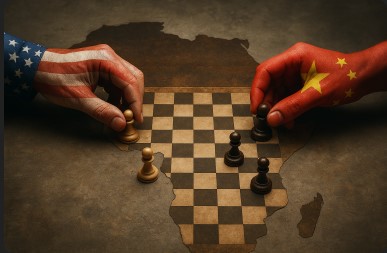
IS AFRICA OUTSOURCING ITS AGENCY IN THE CURRENT GLOBAL DEVELOPMENT HARD STANCE?
Apart from the United States, Africa, perhaps, is the next place where Trump’s policies divide opinions. From governments to civil society organizations, Trump is either a hero or a villain. Maybe not so much of a hero among African governments, but for many, the dismantling of USAID, the bravado of DOGE, and the imposition of tariffs are examples of how governments on the continent need to operate. Since his return to the White House, global development has faced the biggest setback. Alexander Dayant, writing for the Lowy Institute, observed that aid, health and climate funding were three areas to face considerable setbacks in what appears to be fewer political constraints in a Republican-controlled Congress. Almost a year after his electoral triumph, it appears the defunding of USAID undermines not one but all three areas, particularly as most of these areas intersect in the current global development landscape.
However, what has been more striking in the context of Africa is Trump’s treatment of the continent. During his first term, it was evidently clear that US-Africa relations would be shaped by the character and image of Trump as a global leader. Since his re-election, the US-Africa strategy has been about moving away from a charity-based model to an agency-based model with preferences for partnership and transaction-based foreign policy that benefits both American companies and African partners. Although by sheer weight of contribution, America’s withdrawal from several multilateral agreements puts a dent in ODA that largely benefits developing countries, Western governments in general have responded to the emergence of South-South cooperation by repositioning themselves as development partners. For instance, the UK government’s strategy for international development prioritizes investment partnerships to unlock global development.
Across the continent, a growing upheaval against traditional Western donors reflects a certain collective awareness that aid cannot be a permanent solution to underdevelopment. Political and business leaders on the continent have consistently decried the unfairness of the global financial system. For decades, ODA has been used as a ‘honeypot’ to perpetuate this unfairness in the global financial market, obscuring the fact that strategic interests often drive international development. For traditional partners like France, whose colonial ties have persisted in regions like the Sahel, the recent severance of these ties has occurred alongside the growth of populism and an increasing recognition of bad faith. Thus, economic relationships crafted under colonialism predetermine winners and losers, which, to a large extent, leaves many of these African states as eventual losers.
The Search for Better Partners: BRICS to the Rescue?
African leaders find themselves in an untenable position; many of the countries, particularly those with reserves of critical minerals, are caught between two spheres of influence. The emergence of BRICS as a rising counterweight to Western-led institutions presents both opportunities and challenges; yet, the emphasis on partnerships from both sides suggests a political, rather than an economic, conundrum. For decades, the principal logic that has underpinned foreign policy among African nations has been non-alignment. In theory, African nations need not side with any superpower, but in practice, economic development is fashioned on economic partnerships that reflect an inherent political alignment. For some analysts, Non-alignment is irrelevant in a multipolar world, and if it were to mean anything, it would be the power to align with whoever we like. Others still maintain that being non-aligned is simply a survival instinct in the face of great power rivalries.
A concerted non-aligned foreign policy position, however, is turning out to be moribund in the current geoeconomic circumstances. The alliance of Sahel States has completely broken ranks with the Non-Aligned Movement based on what it considers unfair economic relations, premised on a neocolonial blueprint. In his famous speech, Kwame Nkrumah said, “We face neither East nor West; we face forward.” But today, Africans insist that the East is the new forward, a statement in denouement of non-alignment. Contemporary geopolitics consists of several complex and intersecting issues. Climate, conflict and security, trade, and infrastructure are not treated as isolated cases but as a collection of global problems that intersect and require strategic solutions.
For most African states, the emergence of BRICS means fairer funding opportunities built on Global South cooperation. Such an expectation often disregards the issue of strategic national interest and overlooks the potential creeping of hierarchy into South-South cooperation. Despite these fears, it is predominantly accepted that BRICS offers an alternative to the existing financial system and provides African states with leverage to negotiate better deals. Besides this point, what are the local responses to the ongoing contest between the geopolitical blocs for African partnership?
An Agency-Alliance Nexus
A diplomatic gridlock between Rwanda and DR Congo needed US intervention, and in exchange for its role, the US attains resources from the DR Congo. In the Sahel region, Russia has deposed France, but both leaders and the masses in the region are certain that Moscow represents fairness. In the southern parts of the continent, China is consolidating its gains. Amidst Beijing’s resource-backed loan model, there is some sense that its non-interference policy gives it an advantage over Western allies. Whether it is Beijing’s Belt and Road Initiative or Washington’s Build Back Better, one thing remains: Africans are prioritizing alliances and partnerships over agency rather than understanding the nexus between them. Indeed, for the general population, what partnership brings better dividends, and on which side of the divide is history more favorable? For most people, historical injustices perpetuated by the West cancel out any moral reparation in the form of development aid and place the East beyond reproach.
Contrary to these positions, none of the blocs can ensure Africa’s interests better than Africans themselves. It is therefore important to prioritize homegrown development policies that value the agency of the African people without sacrificing opportunities to form partnerships. History has consistently shown that partnerships and alliances may end, but agency sustains a polity.